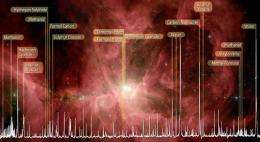Herschel Finds Possible Life-Enabling Molecules in Space

(PhysOrg.com) -- The Herschel Space Observatory has revealed the chemical fingerprints of potentially life-enabling organic molecules in the Orion nebula, a nearby stellar nursery in our Milky Way galaxy.
The new data, obtained with the telescope's heterodyne instrument for the far infrared -- one of Herschel's three innovative instruments -- demonstrates the gold mine of information that Herschel will provide on how organic molecules form in space.
The Orion nebula is known to be one of the most prolific chemical factories in space, although the full extent of its chemistry and the pathways for molecule formation are not well understood. By sifting through the pattern of spikes in the new data, called a spectrum, astronomers have identified a few common molecules that are precursors to life-enabling molecules, including water, carbon monoxide, formaldehyde, methanol, dimethyl ether, hydrogen cyanide, sulfur oxide and sulfur dioxide.
Herschel is a European Space Agency cornerstone mission, with science instruments provided by a consortia of European institutes and with important participation by NASA.
Provided by JPL/NASA




















